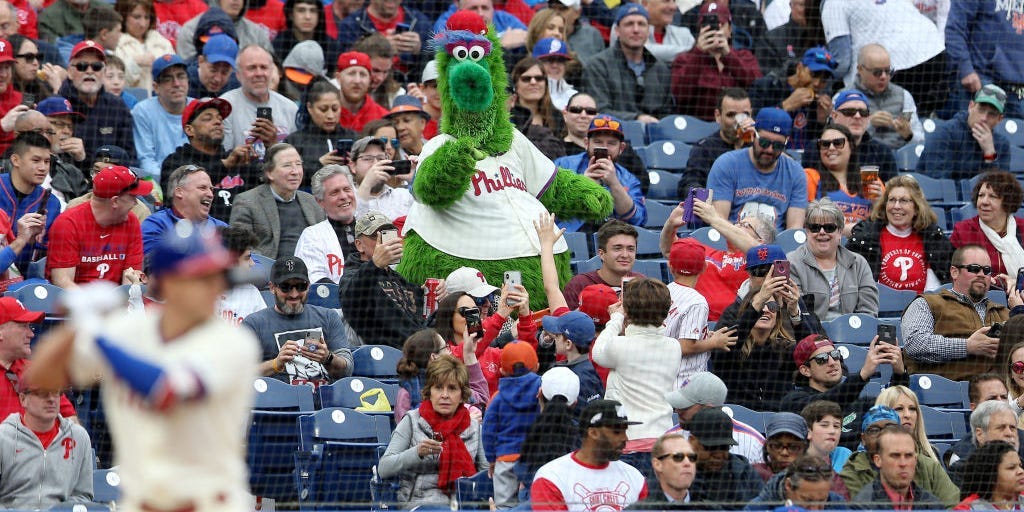Philadelphia’s baseball teams have a knack for winning the World Series around financial crises. Correlation doesn’t equal causation, but investors may be anxiously watching the next games. The Philadelphia Phillies trail the Houston Astros two games to three going into Saturday’s game. Loading Something is loading.
Thanks for signing up!
Access your favorite topics in a personalized feed while you’re on the go.
Superstitious investors may have their eyes glued to this Saturday’s World Series championship game 6 as the Philadelphia Phillies take on the Houston Astros.
That’s because Philadelphia baseball teams have a knack for winning the World Series right around the same time a recession hits and the stock market crashes.
“Whenever a team from Philadelphia wins it all, bad things happen soon after,” the Carson Group’s Ryan Detrick said late last month.
Of course, correlation does not equal causation.
“The irony is not lost on us that our town’s baseball success has coincided with extremely poor market and economic outcomes. The beauty of correlation and causation, though, is that it can be difficult to determine the directionality of a relationship,” Daniel Berkowitz, who works at Prudent Management Associates, told Insider.
Detrick agrees with Berkowitz. “We do not suggest ever investing based on who wins the World Series, but it sure is interesting,” Detrick said.
“If we flip the premise, we might say instead that extremely poor market and economic outcomes are associated with a Philadelphia baseball team’s postseason success. If that’s the case, given the simultaneous stock and bond market sell-off this year, we like the Phillies’ odds,” Berkowitz said.
Here’s a brief history of Philadelphia’s championship wins — for both the Philadelphia Phillies and the Philadelphia Athletics, which played in the city from 1901 to 1954, before moving to Kansas City, Missouri — coinciding with pain for US investors and the broader economy.
The 1910 World Series: The Philadelphia Athletics beat the Chicago Cubs 4-to-1: 25% bear market
The panic of 1910-1911 materialized as the government started to ramp up enforcement of the Sherman Antitrust Act, which regulates competition among businesses and seeks to break up monopolies. The panic led to a 25% sell-off in the stock market.
The 1911 World Series: The Philadelphia Athletics beat the New York Giants 4-to-2: Recession
As the panic of 1910-1911 continued, the broader economy entered a recession for all 12 months of the year. The government’s continued enforcement of the Sherman Antitrust Act led to the breakup of the Standard Oil Company monopoly.
The 1913 World Series: The Philadelphia Athletics beat the New York Giants 4-to-1: Recession
A yearlong recession materialized as production and real income declined. Meanwhile, World War I started a year later.
The 1929 World Series: The Philadelphia Athletics beat the Chicago Cubs 4-to-1: Stock market crash
Just two weeks after the Athletics’ win, the stock market crashed amid an ongoing banking panic, high tariffs, and waning consumer sentiment. The stock market finished the year down 12%, but wouldn’t retouch its peak for about 25 years.
The 1930 World Series: The Philadelphia Athletics beat the St. Louis Cardinals 4-to-2: The Great Depression
The US economy entered a depression that would for nearly four years. Peak unemployment surged to 21%, while GDP and industrial production dropped sharply.
The 1980 World Series: The Philadelphia Phillies beat the Kansas City Royals 4-to-2: Double-dip recession
As Fed Chairman Paul Volcker was fighting stubborn inflation with aggressive interest-rate hikes, the US economy dipped into a brief recession, which was then followed by a swift recovery. That recovery was then followed by a deep recession as businesses adjusted to the sky-high interest rates, which peaked at nearly 20%.
The 2008 World Series: The Philadelphia Phillies beat the Tampa Bay Rays 4-to-1: The Great Financial Crisis
An ongoing housing crisis morphed into a financial panic as banks became insolvent due to their exposure to subprime mortgage loans. The pain soon spread to automakers who had too much debt and were impacted by a pullback in buying by consumers.
“From World War I to the Great Depression to the financial crisis, all took place after a team from the City of Brotherly Love won it all. Is it random? Probably, but to be safe, the Carson Investment Research team is pulling for the Astros,” Detrick told Insider.
